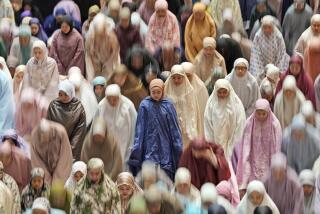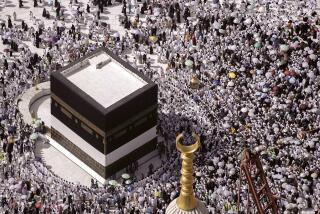A Concise View of Islam for the Non-Muslim
- Share via
For some in the West, Islam remains at best an exotic faith and at worst unfairly stereotyped by those who commit terror in its name.
For Muslims, however, Islam is a deep well of inspiration and guidance that is at once a rampart on which to stand against the evils of the day--egalitarian in its view of the brotherhood of man--and eminently practical in acknowledging the foibles of humanity even as it sees humankind as the crowning creative act of God.
Some Christians and Jews may be surprised that Islam speaks reverently of Moses and Jesus, or that Islamic Scriptures speak of fleeing from persecution in Mecca and finding help and affection among those who say “we are Christians.”
Islamic teaching recounts stories of how an ancient Christian priest, Waraqah, had told a messenger of God that the angel Gabriel had spoken to him, and that a Christian monk, Bahira, had told this same messenger that he would be a prophet.
At best, however, many non-Muslims have only the vaguest ideas about Islam. They may be acquainted with the meaning of the monthlong fast during Ramadan or know that Muslims are expected to pray five times daily in the direction of Mecca.
This can be especially troubling in a region as culturally vibrant and diverse as Southern California, because ignorance has consequences. What is not understood is feared. And there are few fears as deadly as those based on religious hatred, as history and current events attest.
Now comes a book written for non-Muslims that breaks through stereotypes and makes neighbors of strangers. Its author, like an expert and trustworthy guide, leads the uninitiated on a journey on which ignorance is overtaken by knowledge. The author is Akbar S. Ahmed, a fellow of Selwyn College at Cambridge University. He has also been a visiting professor at the Institute of Advanced Study at Princeton University, and at Harvard University.
He is recommended by no less than former Archbishop of Canterbury Robert Runcie, who wrote, “Akbar Ahmed interprets the world of Islam today with lucidity and learning. I know of no writer in English more sensitive to the questions people ask nor better qualified to answer them with apt illustration and a lively style.”
Published in paperback, the book gives a succinct overview of Islam, including descriptions of the life of Muhammad ibn Abdullah, who Muslims believe is the last Prophet of God. Christians will be intrigued by some of the parallels in the lives of Jesus and the Prophet. Both, for example, were tested, Jesus before his active ministry began and the Prophet afterward.
The story of the devil’s temptation of Jesus is well known to Christians and many non-Christians alike. In Matthew 4:8-10 the devil transports Jesus to a very high mountain and shows him all the kingdoms of the world and their splendor. He promises them all to Jesus if Jesus will only worship him. Jesus, of course, declines with righteous indignation.
When the Prophet began preaching against the worship of idols, merchants who were making money off the tourists attempted to bribe him. Says Ahmed: “When the Quraish [merchants] offered him a blank check--untold wealth, leadership, anything--if he gave up his ideas, he replied: ‘I would not do so--even if you placed the sun in my right hand and the moon in my left hand.’ ”
The book contains fascinating explanations of Muslim customs, from fasting at Ramadan to the sacred pilgrimage to Mecca at least once in a believer’s lifetime.
Ahmed does not paper over great differences between Islam and other faiths. Although Islam incorporates elements of Judaism and Christianity, Muslims believe that over time those two faiths strayed from the true path and were in need of correction--a correction that Islam teaches it offers.
The book is more than religious history. It lives up to its title, “Islam Today,” by offering insights and commentary into contemporary events, from the current crisis in Kosovo and Pakistan’s detonation of a nuclear bomb to Islamic revivalism, the Iranian revolution, the Taliban of Afghanistan and the Muslim view of the creation of Israel.
Of particular interest for Southern Californians are Ahmed’s explications of problems and discrimination faced by Muslims living as minorities in non-Muslim countries.
In a borderless world, he Ahmed calls for a new paradigm. “We need therefore a new frame of reference. It can no longer be seen as Islam versus the West; it is Islam and the West or Islam in the West.”
More to Read
Sign up for Essential California
The most important California stories and recommendations in your inbox every morning.
You may occasionally receive promotional content from the Los Angeles Times.













